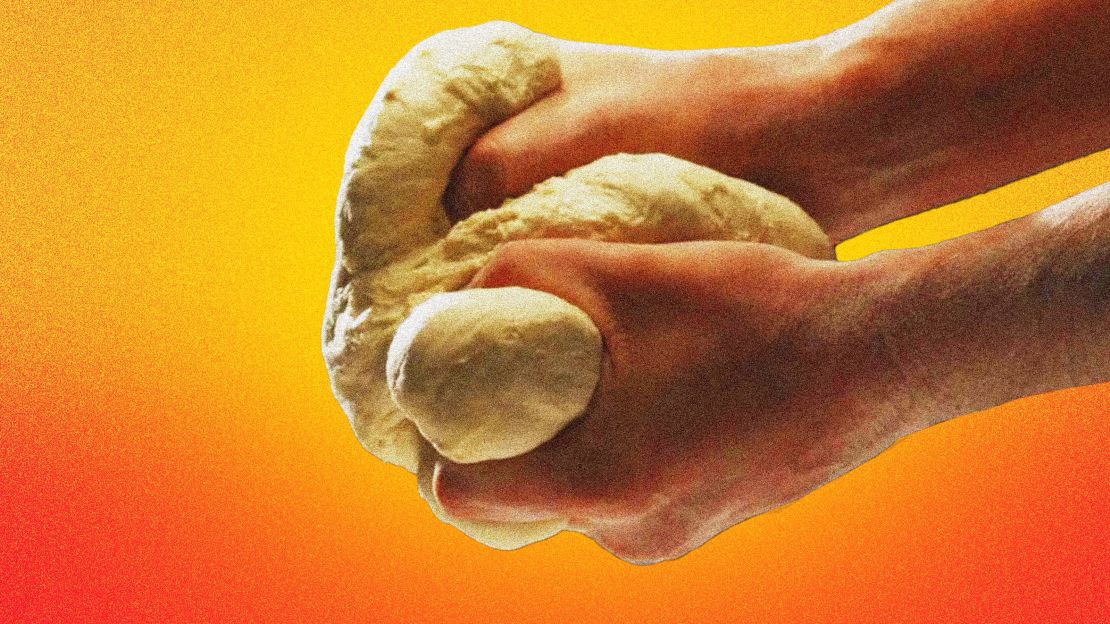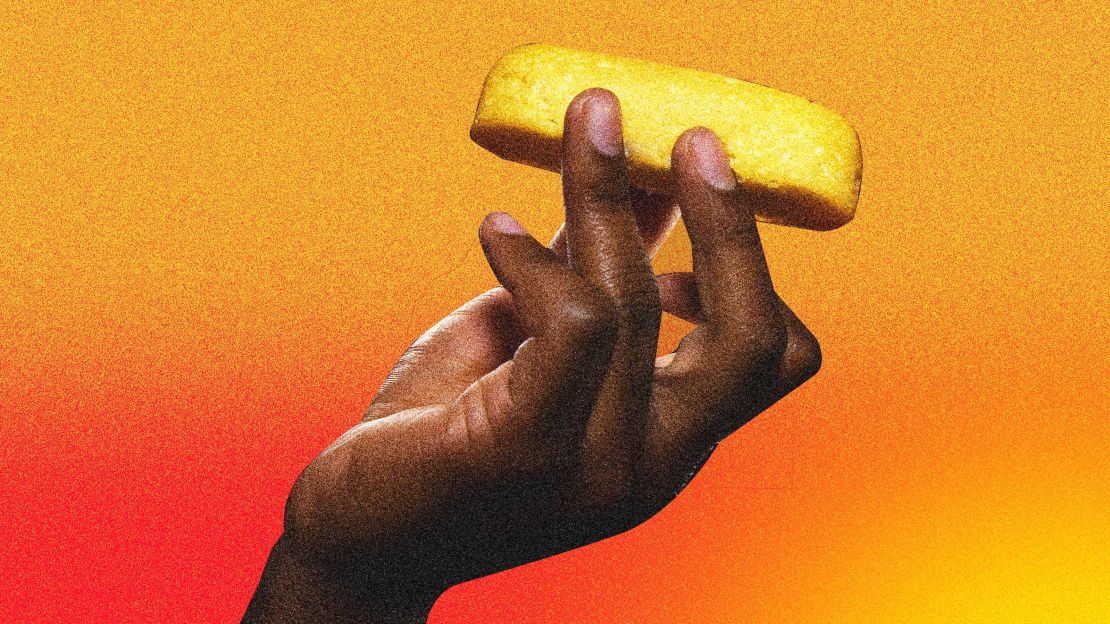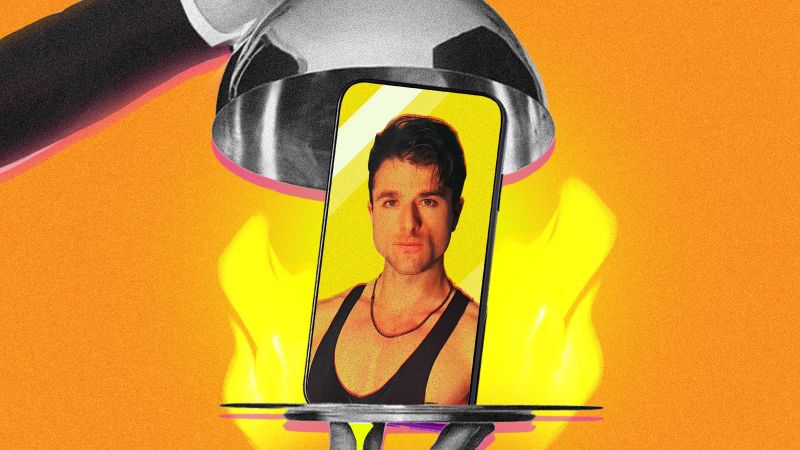CNN
—
Sometimes the videos start with a wink or a blown kiss.
Maybe it’s followed by a shot of washboard abs, or a close-up of fingers mixing pasta dough. The men caress fruit, sometimes toying with a stem on their tongue. They rub ingredients with oil or salt, hands glossing over every curve and crevice.
Every movement is heightened, a thinly veiled raised eyebrow at an audience who may or may not be watching for recipe ideas. Put more bluntly: The videos are meant to be a turn-on.
These are not your regular social media cooking videos. Their stars are blatantly flirting with their audiences, tiptoeing the line between cringe and attractive. There is still an expertly prepared dish at the end, but the journey there is miles away from what other internet cooks might be doing. And the chefs in these videos are wildly, immensely, fantastically popular, with tens of millions of followers combined.
Fans fill their comments sections with marriage proposals and jokes about suddenly being pregnant. Some viewers take their desire a step further: Anthony Randello-Jahn, the 32-year-old chef behind the Donut Daddy account (2.2 million followers across Instagram and TikTok, veiny forearms) has received semi-serious inquiries inviting him over, sometimes from couples.
That these creators have seen such explosive and sustained growth may seem curious, especially at a time when young adults — both Gen Z and Millennials — purport to be having less sex. Women especially have seen a significant drop in sexual desire since the pandemic, studies have shown.
Meanwhile, celibacy has become another trend du jour, as celebrities (Lenny Kravitz, Cheryl Burke) and the masses alike have increasingly pledged against sex for reasons ranging from protesting for reproductive rights to protecting their mental health. Some have even given celibacy a trendy, social media friendly moniker: going “boysober.”
Yet the popularity of these cooking videos reveals just how much sex and sensuality can still be found in every aspect of our culture.
“It’s not as if sexual content isn’t everywhere,” said Chelsea Reynolds, a sexual communication scholar at Arizona State University. “It’s just showing up in unpredictable and unfamiliar ways.”
Sexual fascination with food and food workers isn’t new. Lusting after the pizza delivery guy is, after all, a relatively common Hollywood trope; see also the recent rise of Jeremy Allen White in “The Bear,” whose portrayal of a fictional head chef made the actor a national sex symbol.
The salacious cooking videos and their millions of fans are in conversation with this larger cultural moment, Reynolds said. From the popularity of “The Great British Bake Off” to Covid-era sourdough starters, cooking is a concurrent theme in today’s society, she said. And while these elements might not have directly led to Cedrik Lorenzen (10.4 million followers across Instagram and TikTok, intense jawline) motorboating a mound of dough, it does point to a unique interest in the domestic sphere.

There’s also, of course, a long history of women eroticizing men, Reynolds said, through avenues like romance novels and Playgirl magazine. These videos play into that eroticization: There are closeups of hands, backs and shoulders — and there’s an emphasis on the care these creators are putting into their food.
It’s easy, then, to project onto those movements, imagining a lover rubbing your back or slapping your behind — hence comments like “I’m a mango now” or “I wish I was dough.”
“There’s this erotic imagination that the (viewers) are stepping into as audience members, that allows themselves to feel erotically connected to the actions of being a chef,” Reynolds said.
Call it a flirtation, foreplay, or even parasocial fanfiction. Either way, it makes sense to Randello-Jahn.
“It’s an intimate experience,” he said. “We’re in my house. I’m cooking up something really nice and sweet and tasty. And they get to experience it with me.”
The attraction can’t all be attributed to a hot chef. It’s the song choice, the camera angles, the food itself — every component has to work together to curate the right vibe. Despite the short runtime of the videos, most under two minutes, both Randello-Jahn and Lorenzen said that between recipe development, cooking, filming and editing, the entire process can take up to four days. Creating that intimacy takes work.
While Lorenzen is now one of the most popular food creators on social media, the 33-year-old only just started posting videos on Instagram back in 2021, later joining TikTok. Back then, the platforms were a way to test out recipes and ideas for a future restaurant, and he still views his success as a means to one day opening up his own eateries.
From the beginning, Lorenzen said his videos had a “sense of sensuality.” There are suggestive captions (“Matcha tiramisu, won’t be the only thing she’ll moan about”), winks and not-so-subtle allusions to sex. The idea was to mimic a date night, he said. “Cook and chill” felt more natural to him than “Netflix and chill.”
While it might be easy to diminish this content as cringe, people couldn’t stop watching. Today, each video he posts — from stunner dishes like beef Wellington to haute cuisine desserts — amasses more than 100,000 views at minimum. But perhaps the highest metric of success is the number of creators who have followed. Randello-Jahn started his own foreplay-esque videos in 2022, Rey Jean of KingCooks began in 2023, and many more variations of these videos have come since, to differing degrees of success.
“The trend created around this food thing has now other male influencers copying it, not for the art of it, but more so for the views and maybe the interaction that they get with their female audiences,” Lorenzen said. “I don’t know how I feel about that.”
One thing is for sure: People are interested, and sex always sells.
Even beyond these food videos, sex is still everywhere, despite the sexually conservative underpinnings of our current moment. There’s the success of Netflix’s lusty “Bridgerton,” thinly veiled softcore porn. See also the skyrocketing of “romantasy” novels like “A Court of Thorns and Roses,” the steaminess of recent films like “Challengers” or “Babygirl,” and even the fetishizing of tradwives.
“We see this over and over, throughout history,” Reynolds said. “When society gets tighter, sex leaks out in creative spaces.”
If these food videos illustrate one thing about our moment, it’s the changing ways we communicate sexually.
Younger people get a bad rap for being asexual, Reynolds said, but it’s not really true. Instead, the way they experience sexuality is “highly mediated” when compared to older generations.
Take teen birth rates, which have plummeted when compared to the 1950s and 1960s, according to Pew Research Center. Even just in the last decade, teen birth rates have been cut in half. Reynolds attributed those drops to the internet — until recently, sex and sexuality was explored in person, there was no “online sexual persona to inhabit.” You couldn’t just send nudes back and forth on Instagram, she said, like young people of today might.
“I do think we still exist in a sexual culture, and we just have to look a little bit more carefully at where the sex is happening,” she said. “Because it’s not happening in the same ways that it used to, but that doesn’t mean it’s gone.”

Jean, or KingCooks on social media (490,000 followers across Instagram and TikTok, sultry voice), takes a different approach than some other creators. While his videos mainly focus on the food — you won’t find any dough slapping or sauce licking here — his deep, sensuous voiceovers create an erotic feeling. Jean himself is usually only seen for a moment, during which he raises an eyebrow and hits the viewer with his signature smize.
Jean, 36, began experimenting with these sensual voiceovers in 2023. His followers are mainly women, he said, and like other creators, his comments are filled with marriage proposals and other horny quips. Despite current shifts in cultural trends, Jean doesn’t think sexuality and romance are going away. He used the popularity of smutty romantasy novels as an example. Our desires are just becoming more private, he said.
“Folks can read them, enjoy them, in the privacy of their own home. I think they view social media in the same way,” he said. “If I have a video that hits a million views, I’m not getting a million comments. A lot of people are enjoying this content privately to themselves.”
Whatever is happening on social media, then, is also happening everywhere else in society. We have a long cultural history of shielding our desires, but we can’t suppress them forever. These creators prove it.

